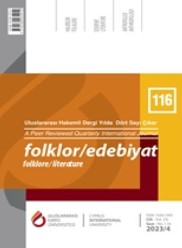Kültürel Miras Bağlamında Kırsal Kültürel Kimliğin Korunmasında Halkbilim (Folklor) Müzelerinin Rolü
The Role of Folklore Museums in the Preservation of Rural Cultural Identity in the Context of Cultural Heritage
Author(s): Abdurrahman Dinç, Oğuz DikerSubject(s): Cultural history, Museology & Heritage Studies, Customs / Folklore, Sociology of Culture
Published by: Uluslararası Kıbrıs Üniversitesi
Keywords: Rural cultural heritage; rural identity; folklore museums; preservation;
Summary/Abstract: Rapidly changing social conditions, along with issues like migration and displacement, have a negative impact on rural culture and cultural identity. The most significant of these negative effects is the degeneration of cultural heritage and the gradual disappearance of cultural values within the context of cultural identity. The disappearance or damage of rural cultural heritage and cultural identity directly affect various aspects such as gastronomic diversity, agriculture, ethnobotany, sustainability, and rural development. Therefore, the preservation of rural cultural heritage and cultural identity is important for the transmission of cultural achievements obtained through social learning to future generations. Museums, research, collection, preservation, and exhibition play a universal role in transmitting each element of culture and cultural identity to future generations. Folklore, which encompasses the formation process, scope of influence, and social characteristics of the affected population, addresses many aspects of traditional culture and cultural identity. Folklore museums, known as distinctive museums where cultural elements obtained through folklore research are exhibited, stand out in terms of bringing folklore research into contact with society, preservation, and transmission to future generations. The aim of this research is to examine the role of folklore museums in the preservation of rural cultural heritage and rural cultural identity. The study was conducted by classifying information obtained from a literature review in line with the research objective. Research findings highlight the contributions of folklore museums in the preservation of rural social memory, as well as the collection, preservation, and exhibition of cultural heritage elements that influence the construction of cultural identity or are formed through identity. They also emphasize the effects of these contributions on the degeneration of identity and the disappearance of cultural heritage.
Journal: Folklor/Edebiyat
- Issue Year: 29/2023
- Issue No: 116
- Page Range: 1077-1090
- Page Count: 14
- Language: Turkish

